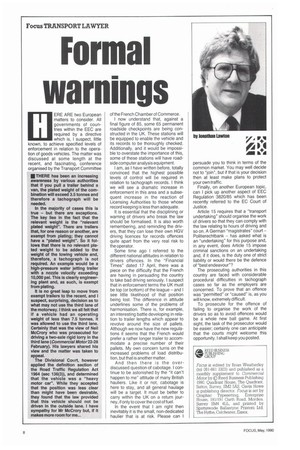Formal warnings
Page 10

If you've noticed an error in this article please click here to report it so we can fix it.
ERE ARE two European matters to consider. All governments of countries within the EEC are required by a directive which is, I suspect, little known, to achieve specified levels of enforcement in relation to the operation of goods vehicles. The matter was discussed at some length at the recent, and fascinating, conference organised by the Transport Committee of the French Chamber of Commerce.
I now understand that, against a final figure of 85, some 65 permanent roadside checkpoints are being constructed in the UK. These stations will be equipped to enable the vehicle and its records to be thoroughly checked. Additionally, and it would be impossible to overstate the importance of this, some of these stations will have roadside computer analysis equipment.
I am, as I have written before, totally convinced that the highest possible levels of control will be required in relation to tachograph records. I think we will see a dramatic increase in enforcement in this area and a subsequent increase in the reaction of Licensing Authorities to those whose record keeping is less than adequate.
It is essential that the disciplining or warning of drivers who break the law should be formalised. It is also worth remembering, and reminding the drivers, that they can lose their own HGV driving licences for records offences quite apart from the very real risk to the operator.
Some time ago I referred to the different national attitudes in relation to drivers offences, In the "Financial Times" dated 17 April, there was a piece on the difficulty that the French are having in persuading the country to take bad driving seriously. I suspect that in enforcement terms the UK must be top (or bottom) of the league — and I see little likelihood of that position being lost. The difference in attitude underlines some of the problems of harmonisation. There is, for example, an interesting battle developing in relation to trailer lengths which appear to revolve around the size of pallets. Although we now have the new regulations it seems that the French would prefer a rather longer trailer to accommodate a precise number of their pallets. My own concern turns on the increased problems of load distribution, but that is another matter.
And then there is the overdiscussed question of cabotage. I continue to be astonished by the "it can't happen to me" attitude of many British hauliers. Like it or not, cabotage is here to stay, and all general haulage will be a target. It must be better to carry within the UK on a return journey, if only to cover the cost of fuel.
In the event that I am right then inevitably it is the small, non-dedicated haulier that is at risk. Please can I persuade you to think in terms of the common market. You may well decide not to "join", but if that is your decision then at least make plans to protect your own traffic.
Finally, on another European topic, can I pick up another aspect of EEC Regulation 3820/85 which has been recently referred to the EC Court of Justice.
Article 15 requires that a "transport undertaking" should organise the work of drivers so that they can comply with the law relating to hours of driving and so on. A German "magistrates" court — Patierechtbank — has asked what is an "undertaking" for this purpose and, in any event, does Article 15 impose criminal sanctions on an undertaking and, if it does, is the duty one of strict liability or would there be the defence of "best endeavour"?
The prosecuting authorities in this country are faced with considerable procedural difficulties in tachograph cases so far as the employers are concerned. To prove that an offence was "permitted" or "caused" is, as you will know, extremely difficult.
To prosecute for the offence of failing to organise the work of the drivers so as to avoid offences would be a whole new ball game. At first sight, the task of the prosecutor would be easier; certainly one can anticipate that the courts might welcome this opportunity. I shall keep you posted.
























































































































